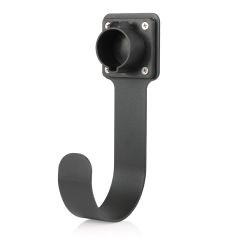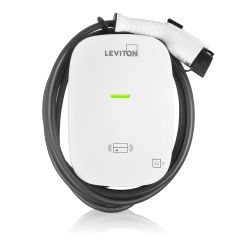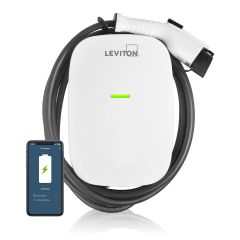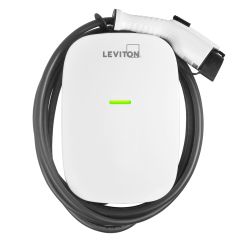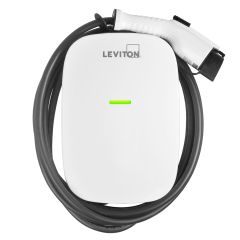Electrical Vehicle Charging (EVP) Solutions for Your Home
Power up your electrical vehicle conveniently at home with our high-quality electrical vehicle plugs ensuring a quick and safe charging experience making the switch to electrical vehicles effortless.
EV Charging Just Got Smarter
Compatible with the My Leviton App*
Schedule charging sessions
Remotely start/stop charging
View all smart devices on one dashboard
View charging status
Receive fault notifications
Not available on all models

*Not available on all models
Electrical Panel Requirements
Does your electrical panel have the capacity to add an EV Charger?
The electrical circuit for the EV Charger must be rated for 25% greater amperage than the charger’s output. For example, a 32 Amp charger requires a 40 Amp breaker. If your panel is nearly or already full, you may need to upgrade your electrical service before installing an EV Charger.
Available EVP Products
Explore our selection of reliable and efficient residential electric vehicle plugs for seamless charging at home.
Frequently Asked Questions
?
Q. Are there any rebates and incentives to purchase an EV or an EV Charging station?
A: There are many Federal and Provincial rebates and incentives being offered to promote the widespread adoption of electric and other alternative fuel vehicles. Whether you are an EV Driver or a business owner, see which apply to you: Click here
A: There are many Federal and Provincial rebates and incentives being offered to promote the widespread adoption of electric and other alternative fuel vehicles. Whether you are an EV Driver or a business owner, see which apply to you: Click here
?
Q. I have a Tesla - where can I charge?
A: “Well, we have good news! With the included Leviton adapter, you can charge your car just about anywhere”.
A: “Well, we have good news! With the included Leviton adapter, you can charge your car just about anywhere”.
?
Q. What is the difference between Level 1 and Level 2?
A: Level 1 charging stations are typically provided with an EV purchase and use a J1772 connector. They are rated 120 Volts and can be plugged into a standard NEMA 5-15 household outlet. Level 1 provides the slowest charging time, averaging 5 miles of range per hour of charging.
Level 2 charging stations are the most common type of charging stations in Canada and North America, using a J1772 connector. As of 2022, over 85% of public EVSE ports in Canada were Level 2. They are rated 240 Volts and charge faster than Level 1, averaging 40 kilometers of range per 1 hour of charging. Level 2 charging stations are common for homeowners, workplaces, and other commercial/public locations.
A: Level 1 charging stations are typically provided with an EV purchase and use a J1772 connector. They are rated 120 Volts and can be plugged into a standard NEMA 5-15 household outlet. Level 1 provides the slowest charging time, averaging 5 miles of range per hour of charging.
Level 2 charging stations are the most common type of charging stations in Canada and North America, using a J1772 connector. As of 2022, over 85% of public EVSE ports in Canada were Level 2. They are rated 240 Volts and charge faster than Level 1, averaging 40 kilometers of range per 1 hour of charging. Level 2 charging stations are common for homeowners, workplaces, and other commercial/public locations.
?
Q. How long will it take to charge a vehicle?
A: Charging times can vary depending on the vehicle, its battery capacity, current level of charge, and the energy source’s capacity. Below are estimated averages. Level 1 charging stations are typically provided with an EV purchase and use a J1772 connector. They are rated 120 Volts and can be plugged into a standard NEMA 5-15 household outlet. Level 1 provides the slowest charging time, averaging 5 miles of range per hour of charging.
Level 2 charging stations are the most common type of charging stations in Canada and North America, using a J1772 connector. As of 2022, over 85% of public EVSE ports in Canada were Level 2. They are rated 240 Volts and charge faster than Level 1, averaging 40 kilometers of range per 1 hour of charging. Level 2 charging stations are common for homeowners, workplaces, and other commercial/public locations.
A: Charging times can vary depending on the vehicle, its battery capacity, current level of charge, and the energy source’s capacity. Below are estimated averages. Level 1 charging stations are typically provided with an EV purchase and use a J1772 connector. They are rated 120 Volts and can be plugged into a standard NEMA 5-15 household outlet. Level 1 provides the slowest charging time, averaging 5 miles of range per hour of charging.
Level 2 charging stations are the most common type of charging stations in Canada and North America, using a J1772 connector. As of 2022, over 85% of public EVSE ports in Canada were Level 2. They are rated 240 Volts and charge faster than Level 1, averaging 40 kilometers of range per 1 hour of charging. Level 2 charging stations are common for homeowners, workplaces, and other commercial/public locations.

